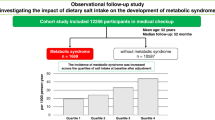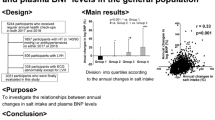Abstract
High salt intake has been linked to both obesity and high blood pressure (BP). Part of the variability of BP attributed to salt intake might be BMI-mediated. To investigate whether hypertension would be an effect modifier in the complex network including salt intake, obesity, and BP, we tested the hypothesis that salt intake has direct and BMI-mediated effects on systolic (SBP) and diastolic blood pressure (DBP). Data from 9,028 participants (aged 34–75 years, 53.6% women) were analyzed. A validated formula was used to estimate daily salt intake from the sodium excretion (12 h urine collection). A path model adjusted for covariates was designed in which salt intake has both a direct and a BMI-mediated effect on BP. In normotensives, standardized beta coefficients showed significant direct (Men: 0.058 and 0.052, Women: 0.072 and 0,061, P < 0.05) and BMI-mediated (Men: 0.040 and 0.065, Women: 0.038 and 0.067, P < 0.05) effect of salt intake on the SBP and DBP, respectively. However, in hypertensive individuals, neither the direct (Men: 0.006 and 0.056, Women: 0.048 and 0.017) nor the indirect effect (Men: −0.044 and 0.014, Women: 0.011 and 0.050) of salt intake on the SBP and DBP were significant. These data suggest that cardiovascular risk stratification should consider the complex interaction between salt intake and weight gain, and their effects on BP of normotensive and hypertensive individuals.
This is a preview of subscription content, access via your institution
Access options
Subscribe to this journal
Receive 12 digital issues and online access to articles
$119.00 per year
only $9.92 per issue
Buy this article
- Purchase on Springer Link
- Instant access to full article PDF
Prices may be subject to local taxes which are calculated during checkout



Similar content being viewed by others
Data availability
Additional data are available from the corresponding author on reasonable request.
References
Balakumar P, Maung-U K, Jagadeesh G. Prevalence and prevention of cardiovascular disease and diabetes mellitus. Pharm Res. 2016;113:600–9.
Lawes CMM, Hoorn SV, Rodgers A. Global burden of blood-pressure-related disease, 2001. Lancet 2008;371:1513–8.
Zhou D, Xi B, Zhao M, Liang W, Veeranki SP. Uncontrolled hypertension increases risk of all-cause and cardiovascular disease mortality in US adults: the NHANES III Linked Mortality Study. Sci Rep. 2018;8:9418.
Mente A, O’Donnell MJ, Rangarajan S, McQueen MJ, Poirier P, Wielgosz A, et al. Association of Urinary Sodium and Potassium Excretion with Blood Pressure. N. Engl J Med. 2014;371:601–11.
Polonia J, Martins L, Pinto F, Nazare J. Prevalence, awareness, treatment and control of hypertension and salt intake in Portugal: changes over a decade. The PHYSA study. J Hypertens. 2014;32:1211–21.
Khaw KT, Bingham S, Welch A, Luben R, O’Brien E, Wareham N, et al. Blood pressure and urinary sodium in men and women: the Norfolk Cohort of the European Prospective Investigation into Cancer (EPIC-Norfolk). Am J Clin Nutr. 2004;80:1397–403.
Larsen SC, Ängquist L, Sørensen TIA, Heitmann BL. 24h Urinary sodium excretion and subsequent change in weight, waist circumference and body composition. PLoS One. 2013;8:e69689.
Yoon YS, Oh SW. Sodium density and obesity; the Korea National Health and Nutrition Examination Survey 2007–2010. Eur J Clin Nutr. 2013;67:141–6.
Lee SK, Kim MK. Relationship of sodium intake with obesity among Korean children and adolescents: Korea National Health and Nutrition Examination Survey. Br J Nutr. 2016;115:834–41.
Feng Q, Yang Z, May M, Tsoi KK, Ingle S, Lee EK, et al. The role of body mass index in the association between dietary sodium intake and blood pressure: A mediation analysis with NHANES. Nutr Metab Cardiovasc Dis. 2021;31:3335–44.
Aquino EM, Barreto SM, Bensenor IM, Carvalho MS, Chor D, Duncan BB, et al. Brazilian Longitudinal Study of Adult Health (ELSA-Brasil): objectives and design. Am J Epidemiol. 2012;175:315–24.
Schmidt MI, Duncan BB, Mill JG, Lotufo PA, Chor D, Barreto SM, et al. Cohort Profile: Longitudinal Study of Adult Health (ELSA-Brasil). Int J Epidemiol. 2015;44:68–75.
Veronese FV, Gomes EC, Chanan J, Carraro MA, Camargo EG, Soares AA, et al. Performance of CKD‐EPI equation to estimate glomerular filtration rate as compared to MDRD equation in South Brazilian individuals in each stage of renal function. Clin Chem Lab Med. 2014;52:1747–1754.
Lipschitz DA. Screening for nutritional status in the elderly. Prim Care. 1994;21:55–67.
Lin X, Alvim SM, Simões EJ, Bensenor IM, Barreto SM, Schmidt MI, et al. Leisure Time Physical Activity and Cardio-Metabolic Health: Results From the Brazilian Longitudinal Study of Adult Health (ELSA-Brasil). J Am Heart Assoc. 2016;5:e003337. https://doi.org/10.1161/JAHA.116.003337
Mill JG, Baldo MP, Molina M, Schmidt MI, Barreto SM, Chor D, et al. Sex‐specific patterns in the association between salt intake and blood pressure: the ELSA‐Brasil study. J Clin Hypertens. 2019;21:502–509.
Mill JG, Silva AB, Baldo MP, Molina MC, Rodrigues SL. Correlation between sodium and potassium excretion in 24‐ and 12‐h urine samples. Braz J Med Biol Res. 2012;45:799–805.
He FJ, Tan M, Ma Y, MacGregor GA. Salt Reduction to Prevent Hypertension and Cardiovascular Disease: JACC State-of-the-Art Review. J Am Coll Cardiol. 2020;75:632–47.
Baldo MP, Rodrigues SL, Mill JG. High salt intake as a multifaceted cardiovascular disease: new support from cellular and molecular evidence. Heart Fail Rev. 2015;20:461–74.
He FJ, Marrero NM, MacGregor GA. Salt intake is related to soft drink consumption in children and adolescents: a link to obesity? Hypertension 2008 Mar;51:629–34.
Thompson P, Logan I, Tomson C, Sheerin N, Ellam T. Obesity, sex, race, and early onset hypertension: implications for a refined investigation strategy. Hypertension 2020;76:859–65.
Sabir JSM, El Omri A, Banaganapalli B, Aljuaid N, Omar AMS, Altaf A, et al. Unraveling the role of salt-sensitivity genes in obesity with integrated network biology and coexpression analysis. PLoS ONE. 2020;15:e0228400.
Feng Q, Yuan S, Yang Q, Lu Y, Loos RJF, Li GHY, et al. Causal associations between urinary sodium with body mass, shape and composition: a Mendelian randomization study. Sci Rep. 2020;10:17475.
Sallehuddin SM, Rashidah A, Othman F, Aziz NSA, Palaniveloo L, Nor NSM, et al. Sodium intake assessed by 24-h urine excretion and its relationship with anthropometric measurements in Malaysian adults. J Health Popul Nutr. 2021;40:9.
Nam GA, Kim SM, Choi MK, Heo YR, Hyun TS, Lyu ES, et al. Association between 24-h urinary sodium excretion and obesity in Korean adults: A multicenter study. Nutrition 2017;41:113–9.
Ma Y, He FJ, MacGregor GA. High Salt Intake: Independent Risk Factor for Obesity? Hypertension 2015;66:843–9.
Ma Y, He FJ, Sun Q, Yuan C, Kieneker LM, Curhan GC, et al. 24-Hour urinary sodium and potassium excretion and cardiovascular risk. N. Engl J Med. (e-pub ahead of print 13 Nov 2021).
He FJ, MacGregor GA. Role of salt intake in prevention of cardiovascular disease: controversies and challenges. Nat Rev Cardiol. 2018;15:371–77. https://doi.org/10.1038/s41569-018-0004-1
Strazzullo P, D’Elia L, Kandala NB, Cappuccio FP. Salt intake, stroke, and cardiovascular disease: meta-analysis of prospective studies. BMJ. 2009;339:b4567. https://doi.org/10.1136/bmj.b4567
Acknowledgements
The authors thank all volunteers for their important contributions.
Funding
Brazilian Ministry of Health (Department of Science and Technology) and Ministry of Science, Technology and Innovation (FINEP, Financiadora de Estudos e Projetos), Grants No. 01 06 0010.00, 01 06 0212.00, 01 06 0300.00, 01 06 0278.00, 01 06 0115.00 and 01 06 0071.00 and CNPq (the National Council for Scientific and Technological Development) Universal No. 404183/2021-2.
Author information
Authors and Affiliations
Contributions
SFC and DZ participated in the analysis and interpretation of data and drafting of the manuscript. MPB, PAL, BBD, RHG, IMB, and ROA participated in the conception and design, analysis, and interpretation of data and final approval of the version to be published. JGM participated in the conception and design, analysis and interpretation of data, drafting of the article, critical revision for important intellectual content and final approval of the version to be published.
Corresponding author
Ethics declarations
competing interests
The authors declare no competing interests.
Additional information
Publisher’s note Springer Nature remains neutral with regard to jurisdictional claims in published maps and institutional affiliations.
Rights and permissions
About this article
Cite this article
Chagas, S.F., Zaniqueli, D., Baldo, M.P. et al. The association between salt intake and blood pressure is mediated by body mass index but modified by hypertension: The ELSA-Brasil study. J Hum Hypertens 37, 472–479 (2023). https://doi.org/10.1038/s41371-022-00714-9
Received:
Revised:
Accepted:
Published:
Issue Date:
DOI: https://doi.org/10.1038/s41371-022-00714-9



